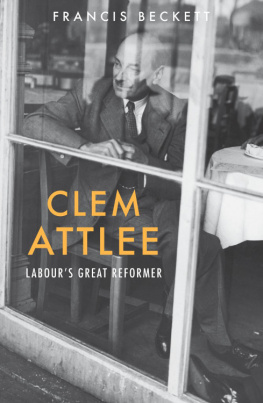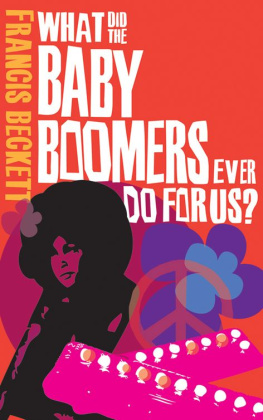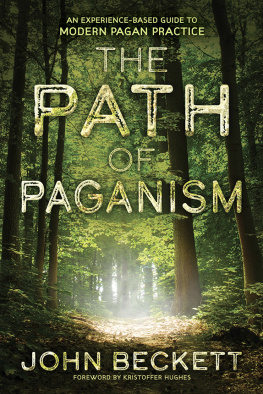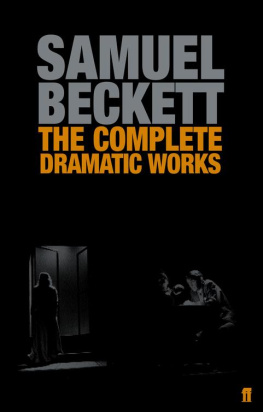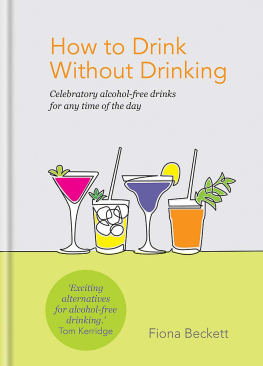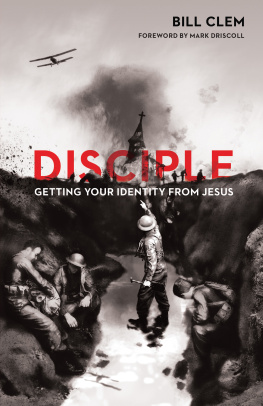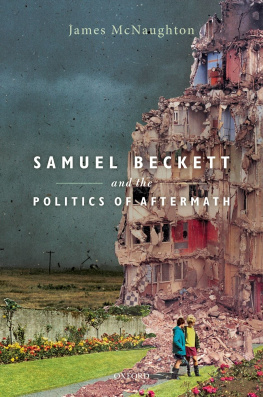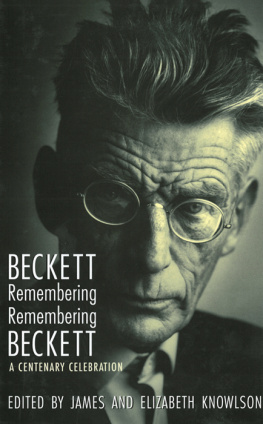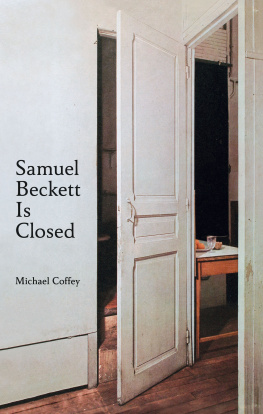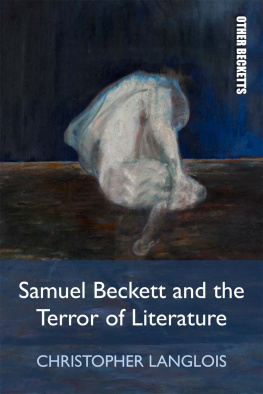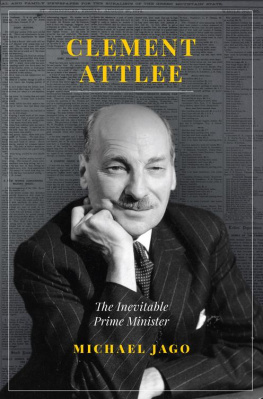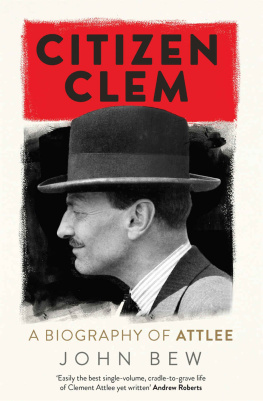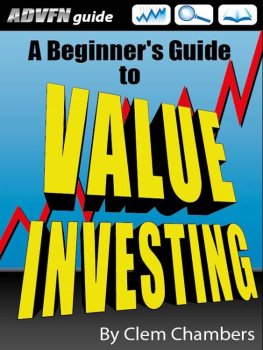Beckett - Clem Attlee
Here you can read online Beckett - Clem Attlee full text of the book (entire story) in english for free. Download pdf and epub, get meaning, cover and reviews about this ebook. year: 2015, publisher: Haus Publishing, genre: Detective and thriller. Description of the work, (preface) as well as reviews are available. Best literature library LitArk.com created for fans of good reading and offers a wide selection of genres:
Romance novel
Science fiction
Adventure
Detective
Science
History
Home and family
Prose
Art
Politics
Computer
Non-fiction
Religion
Business
Children
Humor
Choose a favorite category and find really read worthwhile books. Enjoy immersion in the world of imagination, feel the emotions of the characters or learn something new for yourself, make an fascinating discovery.
- Book:Clem Attlee
- Author:
- Publisher:Haus Publishing
- Genre:
- Year:2015
- Rating:5 / 5
- Favourites:Add to favourites
- Your mark:
- 100
- 1
- 2
- 3
- 4
- 5
Clem Attlee: summary, description and annotation
We offer to read an annotation, description, summary or preface (depends on what the author of the book "Clem Attlee" wrote himself). If you haven't found the necessary information about the book — write in the comments, we will try to find it.
Clem Attlee — read online for free the complete book (whole text) full work
Below is the text of the book, divided by pages. System saving the place of the last page read, allows you to conveniently read the book "Clem Attlee" online for free, without having to search again every time where you left off. Put a bookmark, and you can go to the page where you finished reading at any time.
Font size:
Interval:
Bookmark:

First published by Richard Cohen Books in 1997
First published in paperback by Politcos Publishing in 2000
Copyright Francis Beckett, 2015
ISBN 978-1-908323-77-4
eISBN 978-1-908323-78-1
Typeset in Minion by MacGuru Ltd.
info@macguru.org.uk
All rights reserved.
I want to thank two distinguished academic historians who helped and advised me, and did something to mitigate my instinctively scattergun approach: Professor Colin Holmes and Professor Lord Peter Hennessy.
The most important personal interviews for this book were with Attlees second daughter, Lady Felicity Harwood, and I am most grateful for her kindness, patience and hospitality. Mrs Peggy Attlee, Tom Attlees daughter-in-law, and her son Jeremy Attlee, were also most helpful, and I had an interesting talk with the third Earl Attlee. I had fascinating interviews about Attlees personal life with his eldest daughter Janet Shipton, as well as Patricia Beck and Geoffrey Elborn.
I am grateful to knowledgeable people who guided me through their treasures; Helen Langley at the Bodleian, Angela Raspin at the LSE library, Tamsin Pert at Churchill College, Chris Mobbs at the National Sound Archive, Simon Fowler at the National Archives, and of course Countess Attlee, who guards her treasures carefully and has been tireless and generous in helping me find my way through them. Many people kindly talked to me, or corresponded with me, about their memories of Attlee. Every one of them provided a new insight of some sort.
Some distinguished politicians, trade unionists, diplomats and writers kindly gave me their memories and impressions of Attlee: Lord Boyd-Carpenter; Lord Bruce; Baroness Barbara Castle; Bernard Crick; Geoffrey Elborn; Michael Foot; Kenneth Harris; Denis Healey; Baroness Hollis; Sir David Hunt; Lord Roy Jenkins; Jack Jones; Lord Healey; Lord Longford; and John Platts-Mills.
At Haileybury, my thanks are due to David Jewell, the then Master, Dan Hearn, then head of politics, and Bill Tyrwhitt-Drake for the Old Haileyburians. At the Law Society, John Randall and Lynn Quinney helped me to find out about past Law Society President, Henry Attlee. Billy Dove at the Attlee Foundation pointed me towards some useful sources.
Some old friends of mine turned out to have met Attlee or heard him speak, like Ellis Kopel, a young reporter on the Walthamstow Guardian when Attlee was MP for Walthamstow.
And I would not like to let this book go to press without saying what a pleasure it is to be working again with my delightful friends at Haus Publishing; to renew my relationship with Barbara Schwepcke and Harry Hall, and to work for the first time with my excellent editor Emma Henderson.
Clement Attlee was the greatest changemaker who ever occupied 10 Downing Street. Hes also the politician whom Ed Miliband most admires.
So 2015, the seventieth anniversary of the 1945 election which made Attlee Labours second Prime Minister, and the year when Miliband hopes to become Labours seventh Prime Minister, seemed like a good year to tell the world all I can about this brisk, taciturn, conventional, short, balding revolutionary, whose biography I first wrote in 1997. This book is a much expanded, revised and updated version of that one; a new house built on the old foundations.
If Miliband models himself on his political hero, hes not doing a bad job of it. When Clement Attlee was elected Labour leader in 1935, people said that such an uncharismatic, ordinary-sounding, little man could never be elected Prime Minister very similar to what has been said of Miliband.
Attlee was chosen partly because the front runner, Herbert Morrison, seemed to be too close to Ramsay MacDonald, the good-looking, charismatic Labour leader with a beautiful voice, beloved of duchesses, who was widely perceived to have dumped all Labours principles even before he dumped the Labour Party itself. Ed Miliband was elected partly because his brother, David, was perceived as being too close to Tony Blair.
The night Attlee was elected, a bitterly disappointed Hugh Dalton wrote in his diary: And a little mouse shall lead them. He and others continued, for the next ten years, to plot to get Attlee replaced for reasons which sound remarkably contemporary. Ellen Wilkinson spelled them out in the Sunday Referee: Stars are as necessary to a political party as to a film. Herbert Morrison and Stafford Cripps were stars. Attlee, she said and who could argue? was not a star.
Attlees strength was his certainty, his ruthless self-belief, his decisiveness. His decision-making process was like a steel trap. When Britain had a war-ravaged economy and needed a vast American loan just to stay afloat, Attlee introduced a full-blooded welfare state while Morrison and others were urging caution. When the whole weight of the medical and commercial establishments, as well as the national press, were mobilised against Nye Bevans proposals for a National Health Service, Attlees support never wavered. If it had, we wouldnt have one.
He made momentous decisions, often against all advice, then went to bed and slept soundly. He never revisited his decisions.
Ed Miliband, to the horror of many of his colleagues, unexpectedly refused backing for David Camerons proposal to bomb President Assads installations in Syria, though the Prime Minister had recalled Parliament specifically to get this endorsement. If Miliband had done the conventional thing, which everyone expected him to do, we could have found ourselves bombing Assad at the same time as we bombed Assads enemy, the Islamic State.
He took on the Murdoch empire, to the shock of many of his front bench ever since Tony Blair went to pay homage at the court of King Rupert, its been accepted wisdom that no one can become Prime Minister in Britain if Murdoch is determined that they shouldnt.
I talked recently to someone who, each week, sees Milibands confrontations with David Cameron at close quarters, who tells me that there is a toughness and resilience about the man: You watch him get beaten up, and walk away calmly, and come back when he needs to. Most people look downcast when that happens to them, but he shrugs it off.
Attlee short, bald and unprepossessing as he was must have looked much the same after his weekly mauling at the hands of the experienced, avuncular, ruthless Stanley Baldwin.
Attlee made the public sector the driving force of the welfare state. Local authorities were the engine of his education and housing programmes; central government delivered the National Health Service. And, under Miliband, no longer do we hear from the Labour leader the admiring prattle about big business and rich people that were such a feature of the Blair years.
By the time Attlee fought his first general election as leader in 1936, quite a few Labour MPs were finding it hard to forgive him for being unobtrusive and a little too left-wing for comfort, as is the case today with Miliband. The next year, Attlee published The Labour Party in Perspective, and offered his reasoning in a vintage Attlee passage terse, undramatic and utterly unyielding:
I find that the proposition often reduces itself to this that if the Labour Party would drop its socialism and adopt a Liberal platform, many Liberals would be pleased to support it. I have heard it said more than once that if Labour would only drop its policy of nationalisation everyone would be pleased, and it would soon obtain a majority. I am convinced it would be fatal for the Labour Party People who say socialism curtails individual liberty belong invariably to the class of people whose possession of property has given them liberty at the expense of the enslavement of others A far greater restriction on liberty is imposed on the vast majority of the people of this country by poverty How little would those who so easily recommend this to the workers appreciate being transferred from their pleasant homes in Surrey or Buckinghamshire to Whitechapel or the Black Country?
Font size:
Interval:
Bookmark:
Similar books «Clem Attlee»
Look at similar books to Clem Attlee. We have selected literature similar in name and meaning in the hope of providing readers with more options to find new, interesting, not yet read works.
Discussion, reviews of the book Clem Attlee and just readers' own opinions. Leave your comments, write what you think about the work, its meaning or the main characters. Specify what exactly you liked and what you didn't like, and why you think so.

